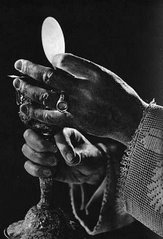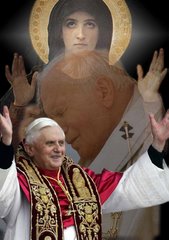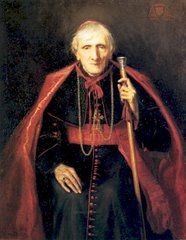On January 14, 2007 the joint LSU and UF Parousian meeting convened in
At the Napolitano’s, an Italian restaurant, Michael Denton presented on Fulton J. Sheen’s Life of Christ. The presentation focused on a reflection on Christ’s life and was delivered Fall Semester 2006. Of course Michael faced greater difficulties as he endured constant interruption from the servers and the noisy atmosphere typical of popular dining, yet he remained calm, poised, and on topic delivering an incredibly insightful meditation. After dinner we reconvened at Jason LaLonde’s house for Angela’s presentation.
Angela’s presentation, titled American Republicanism and Catholicism: Beginnings of the Catholic Church in America, dealt with the first United States Bishop, John Carroll, and the role of early Catholics in the American government. Her thesis was that Catholicism best influenced religious society in terms of religious freedom through their concept of religious freedom. Republicanism, in this instance, refers to a type of government that derives its power from the people. The controversy arises over the participation in the early republic because of the dominant protestant consensus that prevailed in the early
Many protestant contend that protestant Christianity primarily influenced the formation of the
Catholicism also had an understanding of the freedom of conscience. Catholicism has some of the most favorable conditions to conform to American government. John Carroll, the voice of the
Carroll responded by emphasizing the Catholic faith based on reason is compatible with a democratic society and there will not be freedom if Catholics do not have political freedom. Wharton criticized the Church’s teaching that there is no salvation outside the Church. Carroll countered that the Church teaches that all men and women who seek true religion are a part of the universal church (reaffirming that there is no salvation outside of the Church, and each person has a responsibility to seek the truth). Conscience cannot explain away everything so it is reasonable to appeal to a higher authority for interpretation. Need to properly inform your conscience in order to exercise a true freedom of conscience. Carroll further encourages the toleration of different religions and criticizes Wharton for trying to create a hostile environment for Catholics. Catholics have just as much right to freedom as any other American.
Carroll had open policy on encouraging religious tolerance but in such a way that did not compromise that authority of
Following Angela’s presentation we enjoyed an engaging and insightful dialogue. After about 40 minutes of discussion the meeting concluded. Later some of us journeyed to the student section of UF’s stadium, the Swamp, to pray.






No comments:
Post a Comment